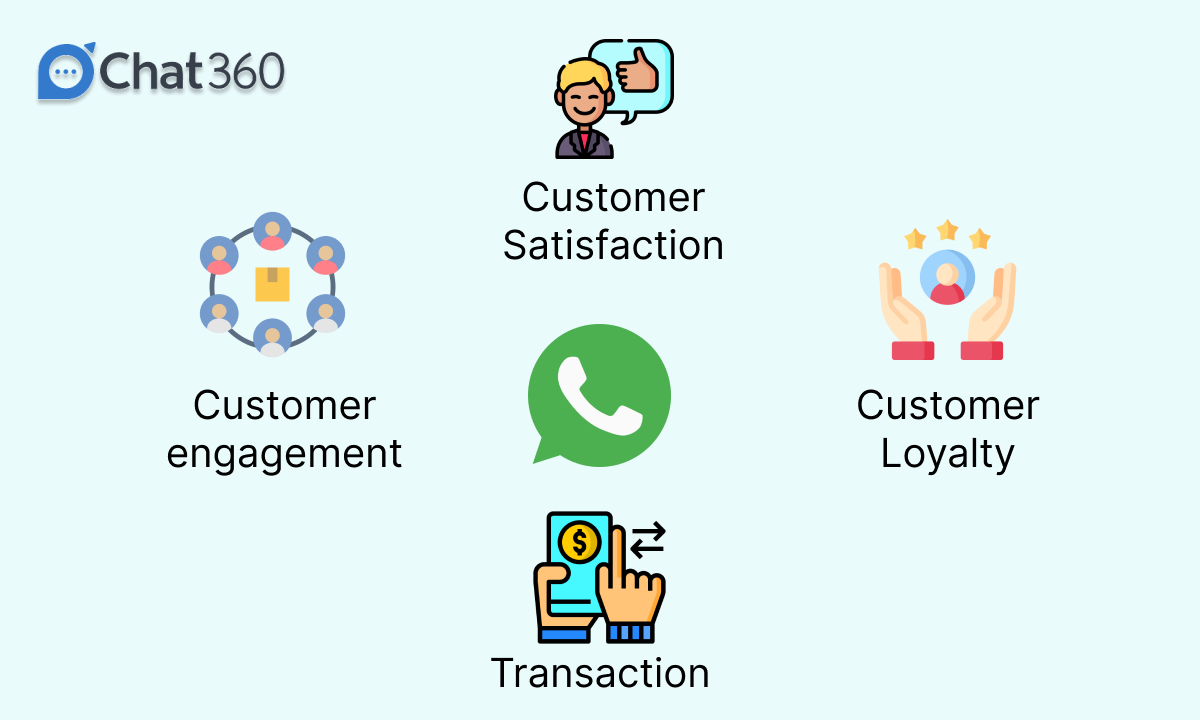Business communication space is evolving at an exponential rate, staying ahead of the latest tools and technologies has become essential for businesses to foster customer engagement.
WhatsApp, a platform once confined to personal messaging, has evolved into a powerful tool for businesses to connect with their customers. The latest updates on WhatsApp for Business have ushered in a new era of customer interaction, making it a vital component for any forward-thinking enterprise.
WhatsApp for Business provides a range of features designed to enhance communication between businesses and their customers. From business profiles and messaging tools to automated responses, the platform offers a seamless and efficient way to engage with a global audience.

The status update feature allows businesses to share real-time updates, promotions, and announcements directly with their customers. This real-time interaction fosters a sense of immediacy and connection that is invaluable in today’s fast-paced business environment.
Why it is essential for Business to use WhatsApp for maximum business outputs
The adoption of WhatsApp for Business is not merely a trend, it is a strategic move for businesses seeking maximum outputs. The sheer ubiquity of WhatsApp across demographics makes it an ideal platform to reach a diverse audience. With over 2 billion monthly active users, WhatsApp provides a vast pool of potential customers waiting to be engaged.
WhatsApp’s end-to-end encryption ensures a secure environment for businesses to communicate sensitive information with their customers. This trust factor is crucial for building and maintaining a positive brand image. Businesses that leverage WhatsApp for communication demonstrate a commitment to customer privacy and data security, thereby enhancing their reputation in the eyes of consumers.
The platform’s multimedia capabilities, including text, images, audio, and video, allow businesses to create rich, immersive content to captivate their audience. This versatility makes WhatsApp an ideal channel for marketing campaigns, product launches, and customer support.
How Integration of GenAI WhatsApp chatbot can help resolve user queries to maximize Customer Engagement
To further elevate customer engagement on WhatsApp, integrating a GenAI WhatsApp chatbot is a strategic move. GenAI’s advanced chatbot technology harnesses the power of artificial intelligence to streamline customer interactions and resolve queries promptly.
The integration of a GenAI WhatsApp chatbot not only enhances efficiency but also ensures a personalized and seamless experience for users.
The chatbot is capable of understanding natural language, allowing customers to communicate with the bot as if they were talking to a human agent. This natural conversational flow enhances user satisfaction and minimizes the frustration often associated with traditional customer support channels.
GenAI’s WhatsApp chatbot is equipped with machine learning capabilities, enabling it to learn and adapt over time. This ensures that the bot continuously improves its responses, providing increasingly accurate and relevant information to users. As a result, businesses can offer a high level of customer service consistently, leading to increased customer satisfaction and loyalty.
How to train WhatsApp Chatbot for your Business
Training a WhatsApp chatbot for business requires a strategic and thoughtful approach. To ensure optimal performance, businesses should follow these key steps:
1. Define Objectives: Clearly outline the goals and objectives you want the chatbot to achieve. Whether it’s providing customer support, handling sales inquiries, or offering product recommendations, having a clear understanding of the bot’s purpose is essential.
2. Gather Data: Collect relevant data, including customer queries, frequently asked questions, and historical chat logs. This data serves as the foundation for training the chatbot and enables it to understand and respond to user queries effectively.
3. Create a Knowledge Base: Develop a comprehensive knowledge base that encompasses information about your products, services, policies, and common customer queries. This knowledge base forms the basis for the chatbot’s responses and ensures accuracy in communication.
4. Natural Language Processing (NLP): Implement Natural Language Processing capabilities to enable the chatbot to understand and interpret user queries in a human-like manner. NLP allows the bot to grasp the context of conversations, leading to more accurate and relevant responses.
5. Testing and Iteration: Conduct thorough testing to identify any gaps or weaknesses in the chatbot’s responses. Iteratively refine the bot’s training based on user feedback and performance data, ensuring continuous improvement.
By following these steps, businesses can train a WhatsApp chatbot that aligns with their specific needs and objectives, providing an enhanced customer experience.
An example for a company on picking customer pain points, documenting and training WhatsApp Chatbot, and using AI-powered Chat360 Dashboard to integrate WhatsApp Chatbot
Consider a scenario where a retail company identified customer pain points related to order tracking and delivery updates. The company decided to address these issues by implementing a WhatsApp chatbot to provide real-time assistance and enhance the overall customer experience.
1. Picking Customer Pain Points: The company conducted a thorough analysis of customer feedback and identified that customers often faced challenges in tracking their orders and receiving timely updates on delivery status. This insight became the focal point for implementing a WhatsApp chatbot to streamline these processes.
2. Documenting and Training WhatsApp Chatbot: The company documented the specific queries related from order tracking & delivery updates.. The chatbots can be trained to serve your customers as per the business needs.
Using this documentation, they trained the WhatsApp chatbot to recognize and respond to various scenarios, such as providing order status, estimated delivery times, handling delivery-related inquiries, troubleshooting, etc.
3. AI-Powered Chat360 Dashboard Integration: To maximize the efficiency of the WhatsApp chatbot, the company integrated it with Chat360, an AI-powered dashboard offered by Chat360.
This integration allowed the company to manage and monitor the chatbot’s performance seamlessly. The Chat360 dashboard provided valuable insights into user interactions, allowing the company to identify trends, analyze customer sentiment, and make data-driven improvements to the chatbot.
As a result of this comprehensive approach, the retail company witnessed a significant reduction in customer queries related to order tracking and delivery updates. The WhatsApp chatbot, powered by Chat360, not only addressed customer pain points but also contributed to increased customer satisfaction and loyalty.
Chat360 – AI powered solutions for businesses
Chat360’s omnichannel chatbots can be integrated with WhatsApp, Instagram, Facebook, website, etc., and also with CRM platforms.
Chat360 emerges as a pivotal solution for businesses seeking seamless integration of chatbots across multiple platforms, including WhatsApp, Instagram, Facebook, websites, and CRM platforms. The versatility of Chat360’s chatbots offers a range of benefits for companies looking to enhance their customer engagement strategies.
1. Multi-Platform Integration: Chat360’s chatbots are designed to operate seamlessly across various communication channels, allowing businesses to maintain a consistent and cohesive brand presence. Whether customers prefer WhatsApp, Instagram, or the company website, Chat360 ensures a unified and efficient communication experience.
2. CRM Integration: Integration with Customer Relationship Management (CRM) platforms is a key feature of Chat360’s chatbots. This integration facilitates the seamless exchange of data between the chatbot and the CRM system, providing businesses with valuable insights into customer interactions. This data-driven approach enables companies to personalize customer interactions, identify trends, and make informed decisions to enhance overall customer satisfaction.
3. Scalability and Flexibility: Chat360’s chatbots are designed to scale with the growing needs of businesses. Whether a company is a small startup or an established enterprise, the chatbots can adapt to the evolving demands of customer engagement. The flexibility of Chat360’s solution ensures that businesses can customize and tailor the chatbot’s functionalities to suit their specific requirements.
4. Analytics and Reporting: The Chat360 Dashboard provides comprehensive analytics and reporting tools, allowing businesses to gain valuable insights into the performance of their chatbots.
Detailed analytics help companies understand user interactions, identify frequently asked questions, and measure the effectiveness of their chatbot across different platforms. This data-driven approach empowers businesses to make informed decisions, refine their chatbot strategies, and continually improve the customer experience.
5. Enhanced Customer Engagement: Chat360’s chatbots go beyond basic interactions; they are designed to engage customers in meaningful conversations. By leveraging advanced natural language processing capabilities, Chat360 ensures that customer queries are not just answered but understood. This results in a more personalized and human-like interaction, enhancing overall customer engagement and satisfaction.
6. Round the clock availability: One of the significant advantages of Chat360’s chatbots is their ability to provide round-the-clock customer support. Whether it’s answering queries on WhatsApp, Facebook, or the company website, these chatbots are always available, ensuring that customers receive timely assistance regardless of the time zone or business hours. This level of accessibility contributes to improved customer satisfaction and loyalty.
7. Cost-Effective Solution: Implementing Chat360’s chatbots proves to be a cost-effective solution for businesses looking to enhance customer engagement. The automation of routine and repetitive tasks, coupled with the ability to handle a high volume of inquiries simultaneously, reduces the need for additional human resources. This cost efficiency allows businesses to allocate resources strategically and focus on more complex and value-added aspects of customer service.
8. Continuous Improvement: The Chat360 Dashboard’s analytical capabilities extend to monitoring chatbot performance over time. By tracking user feedback and analyzing chatbot interactions, businesses can identify areas for improvement and fine-tune their chatbot’s responses. This iterative process ensures that the chatbot evolves with changing customer needs and maintains its effectiveness in providing exceptional customer experiences.
Chat360’s chatbots offer a comprehensive solution for businesses seeking to integrate WhatsApp chatbots seamlessly into their customer engagement strategies. From multi-platform integration and CRM compatibility to scalability, analytics, and continuous improvement, Chat360’s chatbots provide a robust framework to elevate customer interactions across various channels. Businesses that embrace this solution gain a competitive edge by offering enhanced customer engagement, cost-effective support, and the flexibility to adapt to evolving customer expectations.
Schedule a free demo today!
